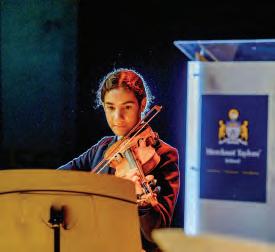
1 minute read
Music
What does GCSE Music Offer me?
GCSE Music is an academic course which deepens your appreciation for and understanding for this art form. The study of music provides a unique academic experience, as it involves both theoretical and practical elements, and has been shown to enhance general performance in other subjects at GCSE.
Advertisement

AQA GCSE Music offers pupils the opportunity to explore and examine a wide variety of musical styles, including pop, jazz, world and Western Classical. Diverse options within the course allow pupils to explore areas of their own interest and encourage them to align these and their individual skills with syllabus topics and their associated musical elements. Pupils analyse set works, compose their own music, perform, and complete a written exam to demonstrate their knowledge and understanding of music from around the world. GCSE music students also have the opportunity to work with professional industry specialists through masterclasses, workshops and concerts. The skills acquired in GCSE music are valued by universities and employers, who see creative subjects as assets. Increasingly, they are looking for young people who, through the study of creative subjects like music, have developed creative thinking, emotional intelligence, adaptability, communication and tenacity. Depending on numbers and timetable, it may be possible to offer Music GCSE as a 10th GCSE option.
What does the course entail?
There are 3 components:
Component 1: Understanding music (40%) - a listening and written exam
Component 2: Performing music (30%) - solo and ensemble
Component 3: Composition (30%) - to a brief and a free composition.
Go to this link to read the GCSE specification: www.aqa.org.uk/subjects/music/gcse/music-8271
Beyond GCSE
Music is admired and respected amongst higher education institutions and in the work place. In an increasingly competitive academic environment, music can give you that edge and provide balance to your course options. Music can be a gateway into areas such as broadcasting, publishing, law, politics and the Civil Service. Rather than limiting your options, music opens doors to a wide range of careers. In recent years, MTS music students have gone on to Oxbridge, music conservatories and other Russell Group universities to study music, law, biochemistry, medicine, business studies and engineering.
Curriculum enrichment
To provide enrichment and challenge, music pupils regularly engage with musicians and other industry professionals through masterclasses, performances and workshops. Composers, performers and recording artists provide girls with opportunities to expand their knowledge of this huge industry. In addition, girls are encouraged to get involved in the School’s musical productions, choral or instrumental ensembles, concerts, recording sessions and tours. There are opportunities to take ABRSM/Trinity/LCM examinations to further develop practical musicianship beyond the classroom and gain extra UCAS points.




